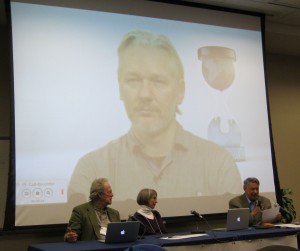By Michael Holloway, John McElligott
Beginning in mid-July, Chicagoans may notice decorative metal boxes appearing on downtown light poles. They may not know that the boxes will contain sophisticated data sensors that will continuously collect a stream of data on “air quality, light intensity, sound volume, heat, precipitation, and wind.” The sensors will also collect data on nearby foot traffic by counting signals from passing cell phones. According to the Chicago Tribune, project leader Charlie Catlett says the project will “give scientists the tools to make Chicago a safer, more efficient and cleaner place to live.” Catlett’s group is seeking funding to install hundreds of the sensors throughout the city. But the sensors raise issues concerning potential invasions of privacy, as well as the creation of data sets with hidden biases that may then be used to guide policy to the disadvantage of poor and elderly people and members of minority groups.







